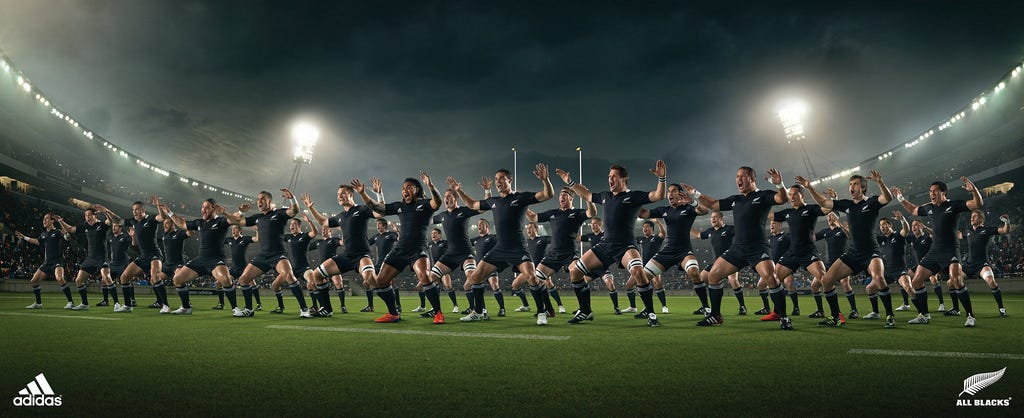
This post explains innovation while looking at the All Blacks Rugby Team, it covers GroupThink, Culture, Strategy, Innovation and Leadership.
Stay with me on the S curve stuff, it will all come together at the end.
S Curves
S curves are a great way to map both business and product lifecycles. S curves follow the shape of the letter S with a shallow start with early adopters and niche clientele. Rapid growth comes next, followed by a dominant position in the market.
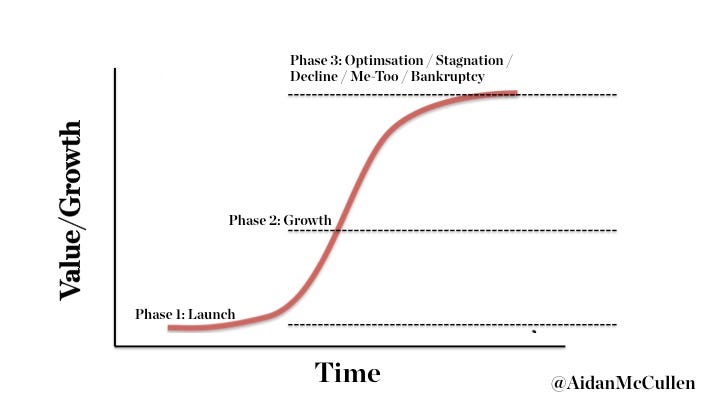
After the rapid growth, businesses or products plateau and experience stagnation, process optimisation, automation job cuts and quite often a me-too proposition.
To Innovate Companies and Leaders need to jump from one S curve to another, but few have the courage to do so. The jump always looks like a step backwards.
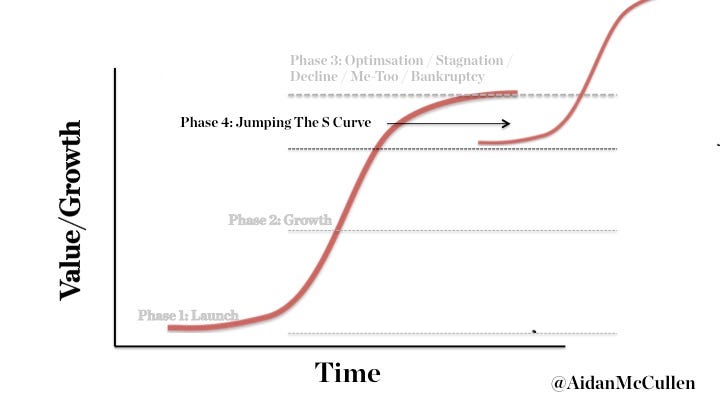
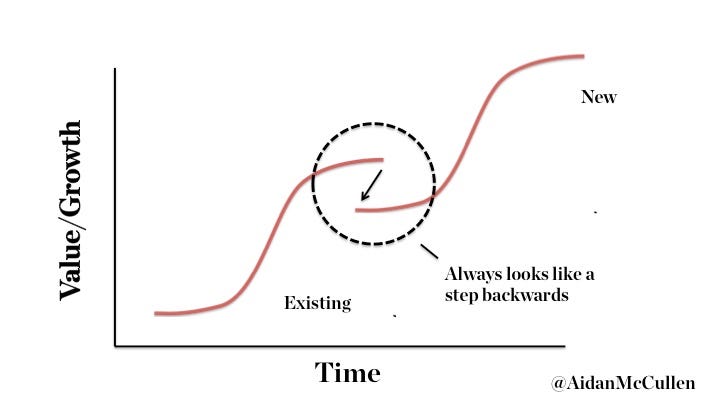
When Blockbuster CEO, Jim Keyes took over he ignored the next ideal jump for Blockbuster which was a more ideal Blockbuster. When quizzed over why he turned down the option to acquire Netflix he stated: (for under 1 million) “Neither RedBox nor Netflix are even on the radar screen in terms of competition”. Not long after Blockbuster went bankrupt and we know the success story Netflix is today.
From Keyes perspective he was doing a good job focussing on what Blockbuster did well today and felt looking at the next jump (which looks like a step back) was a distraction.
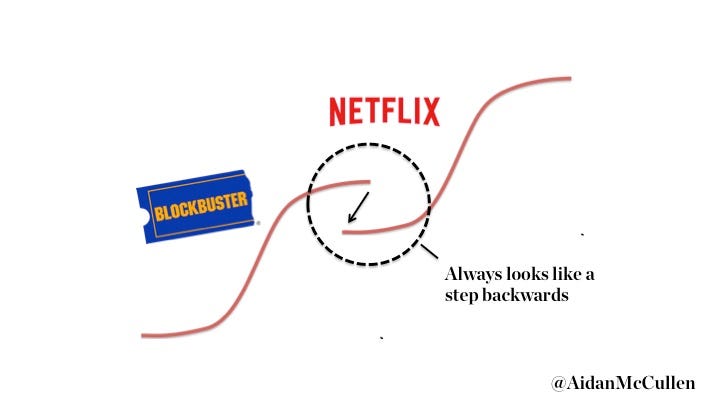
Always Take Your Points, Right?

In rugby, almost everyone — from players to pundits to fans — will (nearly) always say “Take your points”. This is the case when faced with the decision to take 3 points by kicking a penalty or risk losing possession while attempting to get 5 or 7 points by scoring a try. (A few caveats include the variations of dominance in the set pieces or one side having less numbers through sin-binning or red card.
Respected economist Professor David Romer would suggest the kick is the wrong option after he analysed NFL punt data spanning 1998 to 2004.
Romer determined NFL teams shouldn’t punt (kick) when facing fourth down with less than four yards to go for the first.
Despite his study proving that kicking (punting) was the wrong option many professional NFL teams continue to punt. Some experimented, but most went back to what they know and did what everyone else did. No one ever got fired for buying IBM, right?
“Worldly wisdom teaches that it is better for reputation to fail conventionally than to succeed unconventionally.” ― John Maynard Keynes
Follow the Leader
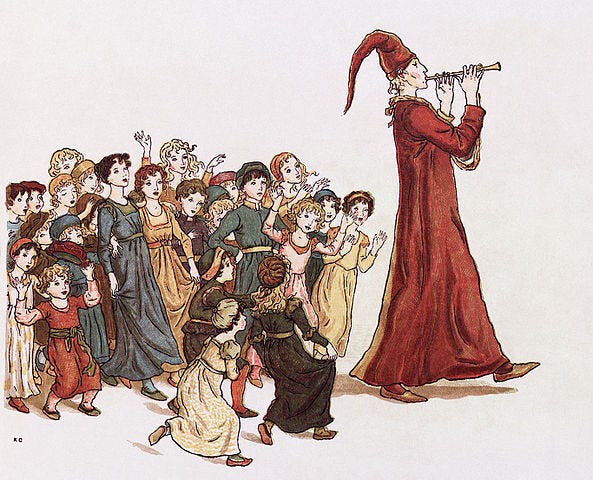
I was a late starter to Rugby, I came from a gaelic football background, but I remember hearing Irish rugby players always talking about the awesome All Blacks. Coaches copied the set pieces and starter moves that the All Blacks perfected. Clubs copied their training techniques. Players copied the All Black players even down to wearing those nose strips, simply because the All Blacks wore them.
When rugby went professional many New Zealand players got contracts all over the globe. Many got the contract mainly because they were from New Zealand rather than being great players. (Admittedly, a lot of them were better than a lot of their Irish counterparts because of their mindset.)
In the early days of professional rugby, it was like a startup culture. Everyone was in this together, there were the beginnings of processes, some players were naturally more professional, while others were more naturally talented and lacked discipline and professionalism.
The latter cohort had very little to be benchmarked against except their performance on match day.
In essence, rugby was on the start of its S curve, most places except New Zealand that is.
Today so many teams are playing the same way, coached the same way and train the same way. As with anything they are nearing the top of the S curve across every subset of what a team can do. So teams need to jump the S curve to the next one to catch up with New Zealand.
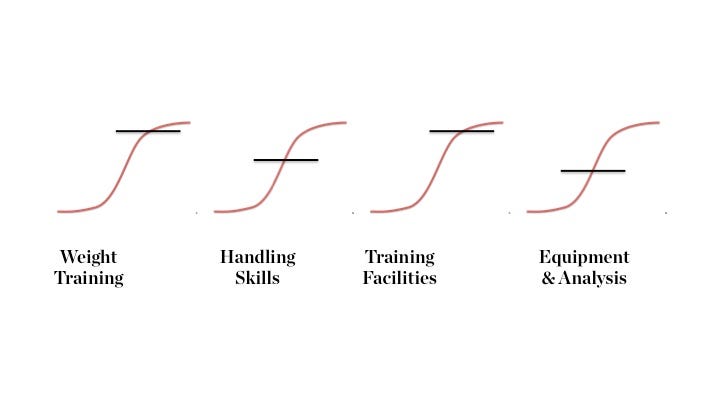
All Blacks are ahead of the (S) curve (then and now)
As with most businesses the natural tendency was to look at the best to see how they do it and then emulate that approach as much as possible.
New Zealand rugby is the archetype of innovation in that it has never stopped innovating, it never stopped looking for improvement, optimisation and the edge that would keep it ahead of the rest.
You could argue that every company is liable to be disrupted, unless they stay ahead of the curve and adopt a “Jump the S curve” approach. (These are the kind of leaders we work with in Katawave).
How does New Zealand do this?
As discussed in a previous Thursday Thought, first they got the right people on the bus (growth minded, humble, high work ethic and adaptable). Then they applied a plethora of strategies and tactics to maintain their lead.
They think Long
The New Zealand Rugby Union was supposedly one of the cash poorest of the major unions. This is because New Zealand reinvested in every aspect of the game. They invested in their academy structures, they invested in training methodologies, their equipment, their infrastructure, their people.
They embrace diversity
When employees, teams or boards of directors come from diverse backgrounds with varying skill-sets it makes a lot of sense, but it is not enough. Diverse teams bring different perspectives, skills and talents to the table.
A lot of other countries have caught up now and embraced the fact that some players (like myself) were late starters and late bloomers. Also, they are looking beyond the obvious to schools who were not rugby playing schools (often wealthy private schools). If you think that so many entrepreneurs did not even get educated, they did not have the opportunity, yet they still succeeded. It is the same in sport, just because someone does not come from a rugby playing school nor region does not mean that means they cannot play, it could be their very advantage. They can being something “different” to the table.
If everyone comes from the same education system and everyone thinks the same and then everyone copies what the best in the world (New Zealand) do, then how can they possibly jump past New Zealand?
They Innovate with Regulation
New Zealand always had their hand up to be the guinea pigs with new laws in rugby. While other countries played on previous rules and regulations New Zealand would be familiar with new rules often a whole season ahead of Northern Hemisphere teams.
They built on a strong established foundation
The All Blacks won the 2015 Rugby World Cup (and indeed the previous 2011 Cup). These victories were not just the result of the preparatory work done coming into competition, but a myriad reasons ranging from culture to mindset.
Culture and mindset are the basis of All Black foundations laid since 1903.
They focus on people: “Better People Make Better All Blacks.”
In 2004, a renowned strategy meeting took place under coach Graham Henry. Out of this meeting senior management and senior players delivered a strategy of developing the character of the players off the pitch, so that they perform better on it.
They called the strategy “Better People Make Better All Blacks”.
They start by getting the right people on the bus, the wrong people off the bus, and the right people in the right seats. When you pick the right people they don’t need to be motivated, they are self-motivated. The lesson here is that it always starts with people.
Authenticity
Authenticity is a word that resonates when observing these players. When Sonny Bill Williams gave his medal to an unknown fan during the on-pitch, post-match celebrations it was not a publicity stunt, but a sign of his mentality.
The All Blacks stand for authenticity and integrity and hard work in New Zealand and they know they stand for something bigger than a bunch of rugby players. They wear the jersey for previous players and for future ones and for ones who will never wear a jersey.
Hire good people and get out of their way
All Black coach Steve Hansen demonstrated this time and time again and does so with authenticity. In almost every interview Hansen praises the players for their decisions on the pitch and their hard work off the pitch.
Hansen says, “Rather than having one person dictating everything off the field and another guy totally responsible for what’s happening on the field, the actual dynamics of the team is a lot different.”
“It doesn’t make sense to hire smart people and tell them what to do; we hire smart people so they can tell us what to do.” — Steve Jobs
When teams are overcoached or have every tactic prescribed, they lose the ability to read situations. Rugby drills are to drill situations into players minds, so that they can play those pre-rehearsed cards when required. When we “tell” players or employees or children what to do rather than let them experience the situations themselves, including failure, we deprive them of the opportunity to learn.
One might argue this is what happened when Italy innovated the ruck law against England in the 2017 ‘6 Nations’ Championship. See below.
https://giphy.com/gifs/aoxsPnbWbf5Qs/html5
Here is another one in France recently:
https://giphy.com/gifs/fXWIkCPNtBENW/html5
They value Grit and Growth Mindset
We previously chatted (here) to Dr. Paul G. Stoltz, author of “Grit” and a leader in the field of Adversity Quotient and Dr. Phillip Matthews, Growth and Leadership Coach (and former Ireland Rugby Captain).
They spoke of the correlation between Grit, through overcoming adversity and having an appetite to learn (a growth mindset). Phillip spoke of his desire to “live” in the pain zone, because that is where the growth happens.
The All Blacks embrace this. They have a saying called “Sweep the Sheds”. This has many meanings, one is to instill a sense of ownership for their surroundings. Another is to ensure they remember their humble beginnings and embrace humility. Finally, this ensures they never have it “too easy” where they take their privilege for granted.
Soft is the new Hard
For businesses and organizations succeed in the world today, they need to change how they hire. People with what were previously disregarded skills such as emotional intelligence, EQ and AQ (adversity quotient) and have a diverse skillset are now the ones savvy employers seek. These skills are embraced by savvy sports teams also.
Me-too offerings
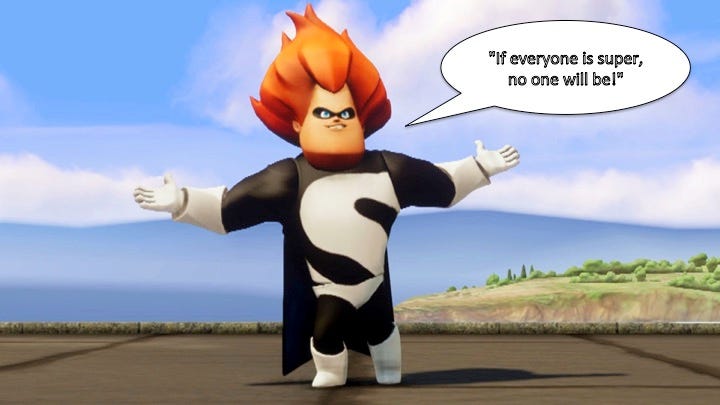
“If everyone’s super, no one will be.” — Syndrome
In the movie ‘The Incredibles’ the villain Syndrome is trying to build inventions that would give anybody superpowers, so that “natural” superheroes wouldn’t be special anymore.
Rugby, like business and, indeed, like any sport will eventually come to top of its S Curve. When that happens, you need to do more than just think differently. You need to be different. If your North Star, both internally to your staff and externally to your customers stands for something and is authentic then this is a great starting place.
The All Blacks have a huge head start on the rest of the rugby playing World, because they constantly review and have a pipeline of authentic players coming through their system.
Companies can learn a lot from them, we all can.
On this week’s innovation show we speak to Velocidi CEO David Dunne and MD Alan McNab. We hear their great back stories and how they met. We hear how and why they formed Velocidi and the ambitions behind the Marketing Automation and Intelligence Platform driven by AI.
Niamh Sherwin Barry is one of the 4 founders of the Irish Fairy Door company. This is a tale of adversity, imagination and influence.
You can subscribe on iTunes here.
Website is here.
TuneIn is here.
Soundcloud is below.
